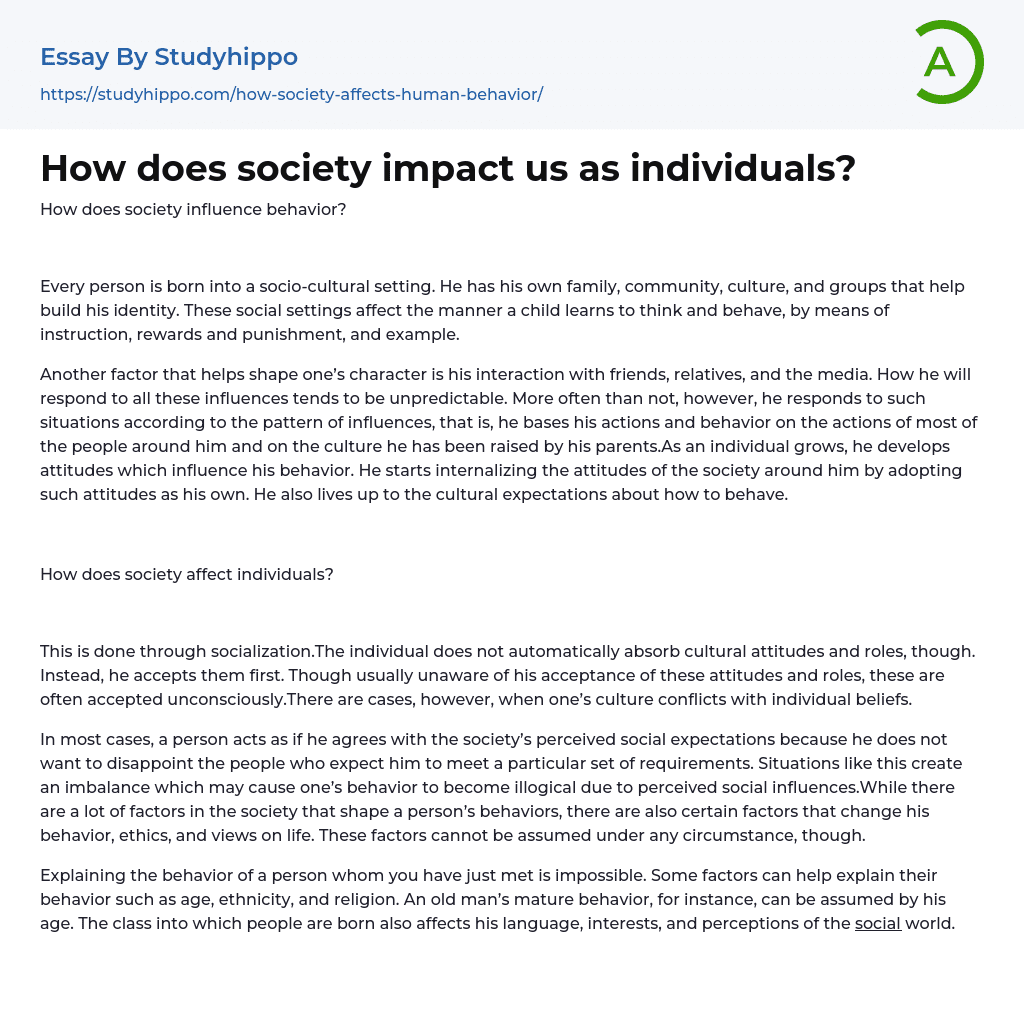How does society influence behavior?
Every person is born into a socio-cultural setting. He has his own family, community, culture, and groups that help build his identity. These social settings affect the manner a child learns to think and behave, by means of instruction, rewards and punishment, and example.
Another factor that helps shape one’s character is his interaction with friends, relatives, and the media. How he will respond to all these influences tends to be unpredictable. More often than not, however, he responds to such situations according to the pattern of influences, that is, he bases his actions and behavior on the actions of most of the people around him and on the culture he has been raised by his parents.As an individual grows, he develops attitudes which influence his behavior. He starts internalizing the attitudes of the so
...ciety around him by adopting such attitudes as his own. He also lives up to the cultural expectations about how to behave.
How does society affect individuals?
This is done through socialization.The individual does not automatically absorb cultural attitudes and roles, though. Instead, he accepts them first. Though usually unaware of his acceptance of these attitudes and roles, these are often accepted unconsciously.There are cases, however, when one’s culture conflicts with individual beliefs.
In most cases, a person acts as if he agrees with the society’s perceived social expectations because he does not want to disappoint the people who expect him to meet a particular set of requirements. Situations like this create an imbalance which may cause one’s behavior to become illogical due to perceived social influences.While there ar
a lot of factors in the society that shape a person’s behaviors, there are also certain factors that change his behavior, ethics, and views on life. These factors cannot be assumed under any circumstance, though.
Explaining the behavior of a person whom you have just met is impossible. Some factors can help explain their behavior such as age, ethnicity, and religion. An old man’s mature behavior, for instance, can be assumed by his age. The class into which people are born also affects his language, interests, and perceptions of the social world.
How does society influence our identity?
Membership in various groups also influences how a person thinks of himself and how others think of him. These groups impose expectations and rules that make the behavior of members more predictable and that enable each group to function smoothly and retain its identity.In the field of science, scientists agree that behavior is developed by environmental expression as well as genetic factors. However, several arguments have sprouted. Some argued that socially expected behavior drives the behavior of an individual while others held that individual expression is characterized by uniqueness and self-introspection.
There were also some scientists who took hold of the viewpoint that behavior is developed through both individual expressions as well as culturally learned normative behavior.No matter which of the theories are true, one thing is certain: that society guides the course of the people within it. Society controls the people through mores and folkways. Social mores remain to be the most important code of conduct. Violations of these mores result in some forms of punishments.
On the other hand, violations of folkways
often result in exclusion or general feeling of social disapproval.Whatever the situation is, it is important to note that the behaviors of individuals are not set in stone. There are really some who will follow the guidelines set by society and there are those who will continue to color outside the lines. No matter how disobedient a person is to the laws and norms of the society, however, there is no denying that society still affects his behavior in one way or the other.
As the Tabula Rasa Theory states, we are born like a blank sheet of paper. How and what we become is greatly attributed to the society we live in as it undeniably shapes and affects our personality and our behavior.
- Perseverance essays
- Expressive essays
- Character Traits essays
- Apology essays
- Compassion essays
- Values of Life essays
- Ethical dilemma essays
- Normative Ethics essays
- Virtue Ethics essays
- Belief essays
- Deontology essays
- Moral essays
- Virtue essays
- Work Ethic essays
- Adult essays
- Aggression essays
- Altruism essays
- Archetype essays
- Behavior essays
- Certainty essays
- Conformity essays
- Deception essays
- Human Behavior essays
- Human Sexuality essays
- Maturity essays
- Morality essays
- Obedience essays
- Procrastination essays
- Reinforcement essays
- Role Model essays
- Acceptance essays
- Age Of Enlightenment essays
- Child Observation essays
- Confucianism essays
- Conscience essays
- Critical Reflection essays
- Destiny essays
- Determinism essays
- Empiricism essays
- Environmentalism essays
- Epistemology essays
- Ethics essays
- Ethos essays
- Existence essays
- Existentialism essays
- Fate essays
- Free Will essays
- Functionalism essays
- Future essays
- Good And Evil essays




